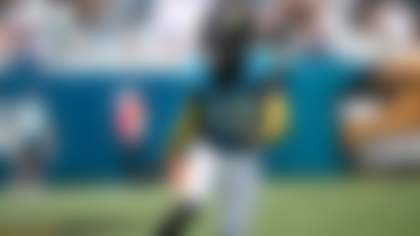When Hall of Fame tailback Tony Dorsett was getting slammed to the turf in the 1970s, or Super Bowl-winning QB Joe Theismann's leg was being gruesomely broken by Lawrence Taylor in the 1980s, it was just football.
Now things are different.
Scientific studies show head trauma can leave long-term damage. Hundreds of former players are suing the NFL in federal court, saying they weren't protected properly from injury. Congress is paying close attention.
Part of the reason the New Orleans Saints were punished so severely for their bounty system could be, as Commissioner Roger Goodell indicated when explaining his decision, that nothing is as critical for the league right now as the safety of players and real concern about concussions.
In the current climate, those issues seem to permeate every decision made at NFL headquarters.
"They're not unrelated. You can certainly see the rules of the National Football League have changed over the years. What used to be considered normal player conduct that could result in serious injury has been expressly prohibited by the rules," Sen. Dick Durbin said in a telephone interview Thursday.
"Teams are dramatically more sensitive now to concussions and how soon a player is ready to play again. It shows awareness of the fact that what happens on a football field is more than a game. Some of these injuries can have an impact on a person's life. It also is an indication that those of us, as fans, should hold these leagues to a higher standard."
Durbin, an Illinois Democrat and the assistant Senate majority leader, is organizing a Judiciary Committee hearing to examine whether bounties in major sports should be considered a crime. He plans to invite witnesses from the NFL, along with officials from the NBA, NHL, NCAA and Major League Baseball.
At an October 2009 House hearing on brain trauma in the NFL, Goodell was taken to task by lawmakers for not doing enough about concussions amid a growing body of medical literature linking head injuries in football with brain disease. That set in motion a series of changes to the league's policies on head injuries - and they keep on coming.
On Wednesday, a few hours after the NFL announced its unprecedented penalties against the Saints, the chairman of the competition committee, Atlanta Falcons president Rich McKay, talked about proposals that will be considered next week at the owners' meetings in Palm Beach, Fla. Among them:
- Allowing each team to designate one player per week who can go on the inactive list because of a concussion and be replaced on the roster.
- Expanding the rule that prohibits horse-collar tackles to also have it cover quarterbacks who are in the pocket.
- Expanding the protection of defenders from crackback blocks by also deeming them defenseless players who cannot be hit in the head or get hit by someone leading with a helmet.
"The protection of the players is the big thing," New York Jets coach Rex Ryan said. "You don't have a league without the players."
Goodell's stern punishment of those involved in the Saints' bounty system sent a message to everyone in the NFL: Do not encourage deliberately injuring players. Goodell also was harsh because of attempts to cover up the bounties.
He suspended Saints head coach Sean Payton for all of next season, and indefinitely banned their former defensive coordinator, Gregg Williams, who was recently hired by the St. Louis Rams. Saints general manager Mickey Loomis was barred for half of 2012, an assistant coach got a six-game ban, and the team also was docked two second-round draft picks and $500,000.
Pittsburgh Steelers safety Ryan Clark thought the penalty for Payton was "extreme."
"They made a point because the coaches were involved," Clark said. "They were going to get somebody."
When the NFL first made its investigation of the Saints public on March 2, droves of former players talked about how off-the-books incentives have been offered in NFL locker rooms for years and years - not on the scale of what happened in New Orleans, but illegal nonetheless.
Theismann, for example, insisted bounties were put on him.
"In a sick way, I guess it's flattering," he said recently. "If you had a bounty on you, you were a pretty good player and they wanted to get rid of you."
One of the ex-players suing the NFL, former Saints receiver Joe Horn, has no doubt there's a connection between the concussion-related court cases and Goodell's actions.
"All of a sudden, he wants to pop his chest out and set up these (punishments)? If he was a great commissioner and he really cared about player safety, he would have fined teams five years ago for what happened, because it happened back then," Horn said. "(Goodell) should fine himself $7 million, because as the commissioner, he should have known years ago this same thing was happening with every other team in the NFL."
Goodell still needs to decide what to do about the two dozen or so players involved in the scheme in New Orleans from 2009-11, when Williams handed out envelopes stuffed with cash to reward particularly vicious hits on specific opponents. Targeted players included quarterbacks Aaron Rodgers, Cam Newton, Brett Favre and Kurt Warner; "knockouts" were worth $1,500 and "cart-offs" $1,000; payments doubled or tripled during the playoffs.
According to the league, Saints defensive captain Jonathan Vilma offered $10,000 to any player who knocked then-Vikings QB Favre out of the 2010 NFC championship game.
The NFL Players Association said Thursday it wants to meet with Goodell to discuss the bounty investigation before players are punished.
"To date, neither the league, nor the Saints, have helped us facilitate interviews with members of management or the coaching staff," the union's statement read. "We expect the league to provide all information so that we can ensure a fair process for all who were involved."
Freelance writer Bryan Lazare in Baton Rouge, La., contributed to this report.



